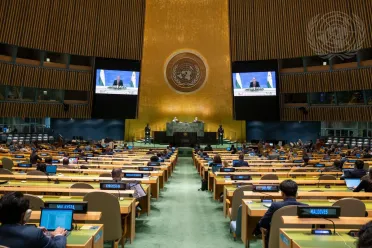Statement
Statement summary
EMOMALI RAHMON, President of Tajikistan, noting that his country celebrated thirty years of independence on 9 September, recalled that in its early days the country was plunged into a civil war. However, it now has peace and stability, maintaining an “open doors” policy on the world stage. Noting that the already unstable global situation has been further complicated by geopolitical and geo-economic competition, as well as the unprecedented spread of infectious diseases, he said States must pursue far-sighted and coordinated policies to address such challenges. The role of international and regional organizations, especially the United Nations, is key to finding effective solutions.
He stressed that recent developments in Afghanistan pose a serious threat to regional security and stability. Afghanistan shares nearly 1,400 kilometres of border with Tajikistan. The Taliban’s rise to power has further complicated the region’s already complex geopolitical process. The Taliban’s failure to deliver on earlier promises to form a comprehensive Government, with the broad participation of Afghan political and ethnic forces, was a matter of serious concern. “Unfortunately, human rights organizations have remained silent upon the violation of the rights of other ethnic groups residing in Afghanistan and the freedoms of its citizens, especially women and children, and have not commented on the matter,” he said, citing several examples.
Describing the current situation in Afghanistan as a humanitarian catastrophe, he affirmed that his country would not interfere in the internal affairs of Afghanistan. However, properly addressing the political and security problems of that neighbouring country meant forming a comprehensive Government through elections, with the engagement of all political groups and national and ethnic minorities. The formation of any Government, without accounting for the interests of all the Afghan people, could lead to catastrophic consequences. The international community should take immediate and effective measures to stabilize the difficult political and security situation and ensure peace and stability in Afghanistan through peaceful means.
Voicing concern that Afghanistan was once again at risk of becoming a breeding ground for international terrorism, he said Tajikistan’s location puts it at the forefront of countering emerging threats and challenges — including terrorism, extremism, radicalization, drug trafficking and other transnational organized crime. He highlighted the successful implementation of the National Strategy on Combating Terrorism and Extremism (2016-2020), as well as the development and adoption of a subsequent strategy for the next five years. Tajikistan also supported United Nations peacekeeping activities and planned to seek a non-permanent seat on the Security Council for a 2028-2029 term, he noted.
Achieving the Sustainable Development Goals, as well as crucial climate targets, was more important than ever, he stressed. Tajikistan — a highly mountainous country — faced losses of hundreds of millions of dollars annually as a result of water-borne disasters. The Climate Change Conference in Glasgow was going to significantly contribute to achieving the goals of the Paris Agreement and accelerating the efforts of the international community in the fight against climate change. Because Tajikistan is recognized as a leader in issues related to water and climate, it has submitted numerous United Nations resolutions in those areas. He added that, in 2022, it will host the International High-Level Conference on the Review of the International Decade for Action "Water for Sustainable Development", leading up to the 2023 Water Conference.
Full statement
Read the full statement, in PDF format.
Photo

Previous sessions
Access the statements from previous sessions.
